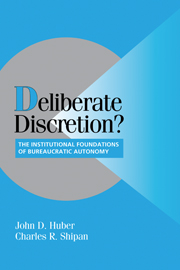Book contents
- Frontmatter
- Contents
- List of Tables
- List of Figures
- Preface
- 1 LAWS, BUREAUCRATIC AUTONOMY, AND THE COMPARATIVE STUDY OF DELEGATION
- 2 RATIONAL DELEGATION OR HELPLESS ABDICATION? THE RELATIONSHIP BETWEEN BUREAUCRATS AND POLITICIANS
- 3 STATUTES AS BLUEPRINTS FOR POLICYMAKING
- 4 A COMPARATIVE THEORY OF LEGISLATION, DISCRETION, AND THE POLICYMAKING PROCESS
- 5 LEGISLATION, AGENCY POLICYMAKING, AND MEDICAID IN MICHIGAN
- 6 THE DESIGN OF LAWS ACROSS SEPARATION OF POWERS SYSTEMS
- 7 THE DESIGN OF LAWS ACROSS PARLIAMENTARY SYSTEMS
- 8 LAWS, INSTITUTIONS, AND POLICYMAKING PROCESSES
- APPENDIX A MMC LAWS USED IN CHAPTER 3
- APPENDIX B POLICY CATEGORIES USED FOR MMC LAWS IN CHAPTER 3
- APPENDIX C PROCEDURAL CATEGORIES USED FOR MMC LAWS IN CHAPTER 3
- APPENDIX D THE FORMAL MODEL OF DISCRETION
- References
- Author Index
- Subject Index
- Titles in the series
2 - RATIONAL DELEGATION OR HELPLESS ABDICATION? THE RELATIONSHIP BETWEEN BUREAUCRATS AND POLITICIANS
Published online by Cambridge University Press: 05 June 2012
- Frontmatter
- Contents
- List of Tables
- List of Figures
- Preface
- 1 LAWS, BUREAUCRATIC AUTONOMY, AND THE COMPARATIVE STUDY OF DELEGATION
- 2 RATIONAL DELEGATION OR HELPLESS ABDICATION? THE RELATIONSHIP BETWEEN BUREAUCRATS AND POLITICIANS
- 3 STATUTES AS BLUEPRINTS FOR POLICYMAKING
- 4 A COMPARATIVE THEORY OF LEGISLATION, DISCRETION, AND THE POLICYMAKING PROCESS
- 5 LEGISLATION, AGENCY POLICYMAKING, AND MEDICAID IN MICHIGAN
- 6 THE DESIGN OF LAWS ACROSS SEPARATION OF POWERS SYSTEMS
- 7 THE DESIGN OF LAWS ACROSS PARLIAMENTARY SYSTEMS
- 8 LAWS, INSTITUTIONS, AND POLICYMAKING PROCESSES
- APPENDIX A MMC LAWS USED IN CHAPTER 3
- APPENDIX B POLICY CATEGORIES USED FOR MMC LAWS IN CHAPTER 3
- APPENDIX C PROCEDURAL CATEGORIES USED FOR MMC LAWS IN CHAPTER 3
- APPENDIX D THE FORMAL MODEL OF DISCRETION
- References
- Author Index
- Subject Index
- Titles in the series
Summary
Political leaders in all forms of government must delegate policymaking authority to bureaucrats. Since this practical necessity can result in substantial authority by bureaucrats over society, concern about excessive influence by bureaucrats has a long history. Montesquieu's The Spirit of the Laws, his eighteenth-century defense of a decentralized aristocratic society, offered perhaps the first argument that political centralization leads to a bureaucratic state and that a bureaucratic state is a distinctive form of despotism. Tocqueville, in Democracy in America, shared a similar concern about centralization and bureaucratic despotism, though his observations of the United States convinced him that decentralized federal systems could be useful mechanisms for preventing the abuse of bureaucratic power.
Max Weber, however, set the modern agenda for research on bureaucracies. In arguing that particular forms of bureaucratic organization were most effective, he also pointed out that “democracy inevitably comes into conflict” with its own “bureaucratic tendencies” (1946, 222). But Weber did not say how this conflict is resolved. On the one hand, he argued that in any form of government
the power position of the bureaucracy is always overtowering. The “political master” finds himself in the position of “dilettante” who stands opposite the “expert,” facing the trained official who stands within the management of administration.
(1946, 233)On the other hand, Weber argued that bureaucracies are designed to serve the interests of the individuals at the top:
The objective indispensability of the once-existing apparatus, with its peculiar, “impersonal character,” means that the mechanism … is easily made to work for anybody who knows how to gain control over it.
(1946, 229)- Type
- Chapter
- Information
- Deliberate Discretion?The Institutional Foundations of Bureaucratic Autonomy, pp. 17 - 43Publisher: Cambridge University PressPrint publication year: 2002

